Juneteenth Special: Racism and Healthcare, The Way Forward With Dr. Adia Harvey Wingfield
Juneteenth, or June 19, is the real day slavery ended for all people in the United States, two years after it’s official end from the Civil War. As a result of 400 years of slavery, there are still privileges White Americans experience in quality of life that Black Americans and other people of color do not. Access to healthcare, food, education, employment opportunities and more have been well documented arenas where Black American quality of life is measurably inequitable.
To discuss racism in healthcare and how to move forward responsibly, we interviewed sociologist and most recently the author of Flatlining: Race, Work, and Health Care in the New Economy, Dr. Adia Harvey Wingfield. She is the Mary Tileston Hemenway professor in Arts and Sciences and Associate Dean of Faculty Development at Washington University in St. Louis. She has also spoken internationally on racism at work and is a contributing writer to Harvard Business Review, TheAtlantic, and others.
WeTheTrillions: Since the beginning of the COVID-19 pandemic there has been a lot of press about how Black communities and other people of color are more vulnerable to the virus for a number of reasons, one of them being access to health care. While that has been pointed out by many media outlets, it remains a statistic that nobody is talking about actionable steps. Is there any concept that you know of in academia that explains the anecdotalization of the nature of discrimination impacting Black people in health care?
Dr. Adia Harvey Wingfield: Right. I don't know of any research that uses that terminology or refers to anecdotalization, but I do know that there's a wealth of research that does talk about the systemic processes that give rise to health disparities that we see present among Black communities and other communities. We know, for example, that Black workers are more likely to be paid less than their White counterparts. We know that housing discrimination exists so that Black communities are concentrated into lower income areas. We know that environmental racism happens so that those lower income areas are often likely to deal with environmental hazards and concerns that are not present in other communities.We know that Black children face disparities in the educational system when it comes to how they are treated by teachers.
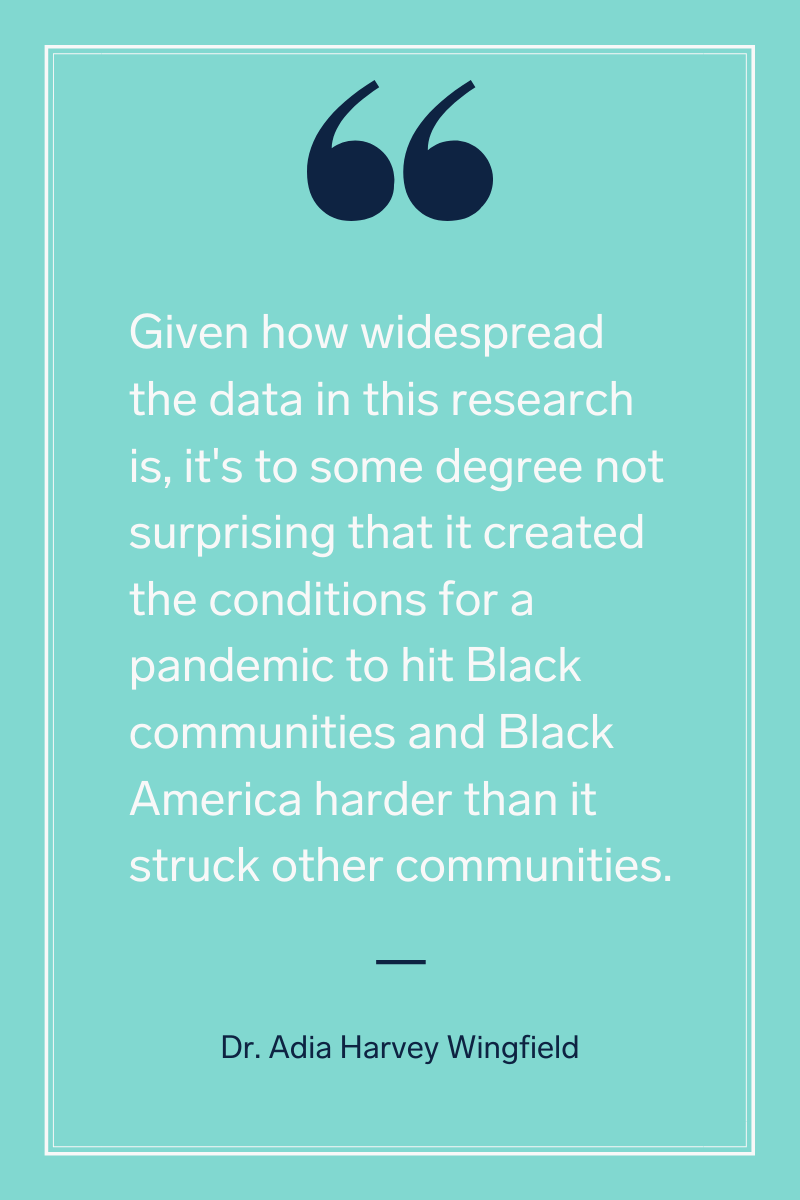
All of these factors produce a cumulative effect that ultimately results in a lower quality standard of living and life experience for Black communities - even to a point of creating a lower life expectancy for Black Americans than for White Americans. Given how widespread the data in this research is, it's to some degree not surprising that it created the conditions for a pandemic to hit Black communities and Black America harder than it struck other communities.
WTT: To that point, many studies have also documented the lack of appropriate care provided to Black people in America. For a sector that is responsible for caring for others, you would think that wouldn't be the case. In your professional opinion, why do you think that's true?
DAHW: Well, based on my research, I think that health care as an industry has a fairly broad constitution, which means that the ethos is different in various professions in health care. So, for example, while nurses certainly are in a profession where there is a focus on caring for patients and for making sure they see improved health care in terms of nurse-patient interactions and the like, that isn't necessarily present in other sectors of health care. I'm thinking specifically of surgery, where I think the focus is less heavily on that type of interpersonal patient care and more heavily based on technical proficiency and skill.
Healthcare is a broad industry where there are a number of different cultures present, where there may not universally be this focus on caring for patients in the way that we might think of when it comes to how nurses might treat patients. Other occupations in health care that are focused on patient care in that particular way may not see that ethos replicated. I do think that health care is an industry where the focus is broadly on improving health outcomes for patient populations at large. That puts the healthcare industry in a rather unique place, which hopefully makes people who are employed in health care systems and people who are decision makers in healthcare, attuned to the fact that these racial disparities and the ways they are perpetuated puts the system at a place where there has to be some focus on race in order to resolve them.
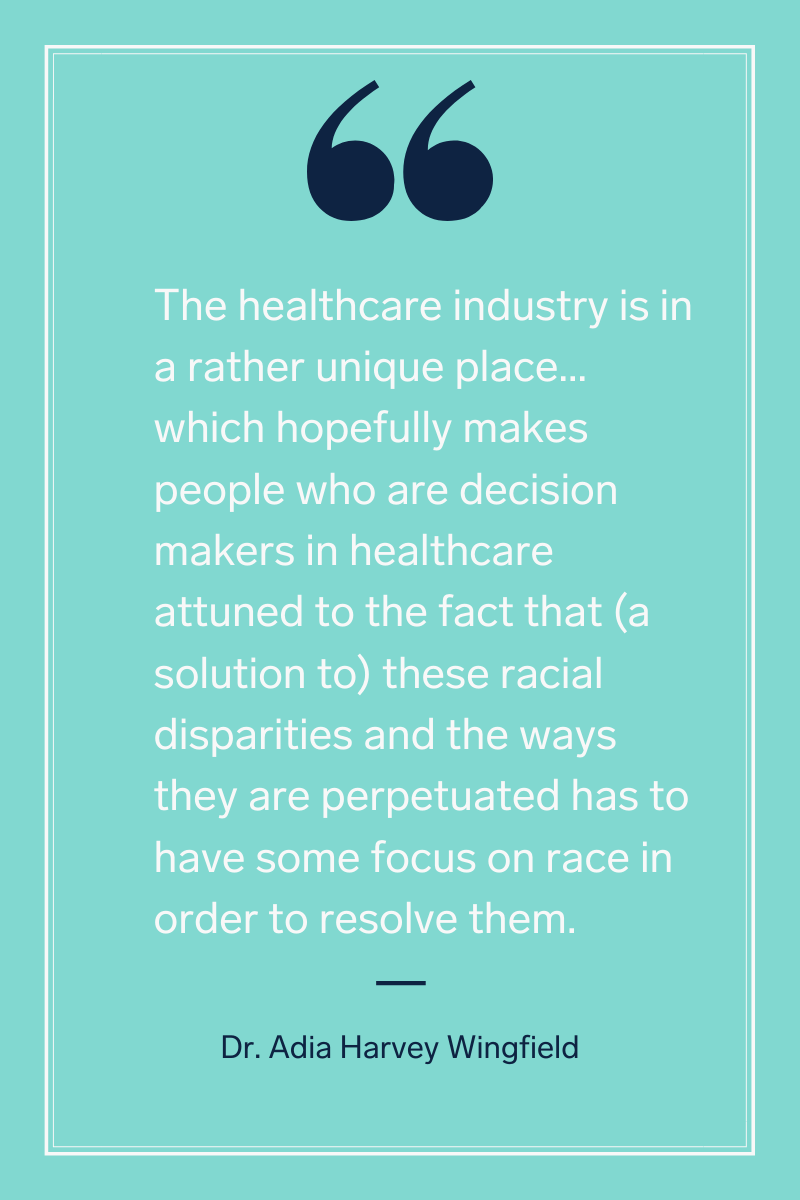
Given that everyone in the healthcare system broadly shares this concern with care and wanting to provide care in various ways, it lends itself to discussions about how best to do that. Especially how best to do that when it comes to the ways in which groups of color Black communities in particular may be underserved.
WTT: Well, that leads to my next question of how to do that. You're familiar with the Flexner Report which is considered by scholars to be a major factor in discrimination in health care across the board. If you had to suggest things for immediate action for a new Flexner Report for 2020 and going forward, what might some of those things be?
DAHW: Right, that's a great question. To help people who may be somewhat unfamiliar with the Flexner Report, it was a report in, I want to say the about 1918, maybe really 1920’s that had a real, significant impact on professionalising and streamlining the medical profession. It also had very deleterious consequences for Black communities in that their report recommended and led to the closing of most historically Black colleges for medicine in the United States. It left open, I believe, only Meharry and Morehouse School of Medicine. What that meant was that many Black aspiring doctors were denied avenues for training and for getting into the field. The consequences still persist today. Black doctors comprise only 5% of those working as physicians. Black nurses comprise only 10% of those who are employed as registered nurses in that profession. We still see Black workers very much underrepresented in these fields.
For a modern day report to focus on addressing these disparities, I think you would have to one, acknowledge that these disparities persist not only in the composition of those who are employed in the healthcare industry and to address those underrepresentation, but also to openly tackle the disparities that exist in the broader society. The fact that Black communities are still likely to be underserved by the health care industry in terms of the ways that they are perceived by healthcare providers, in terms of the access that they have to practices that lead to better health in terms of their access to health care in and of itself and being able to afford health care and to make time for regular wellness and prevention visits and preventative measures.
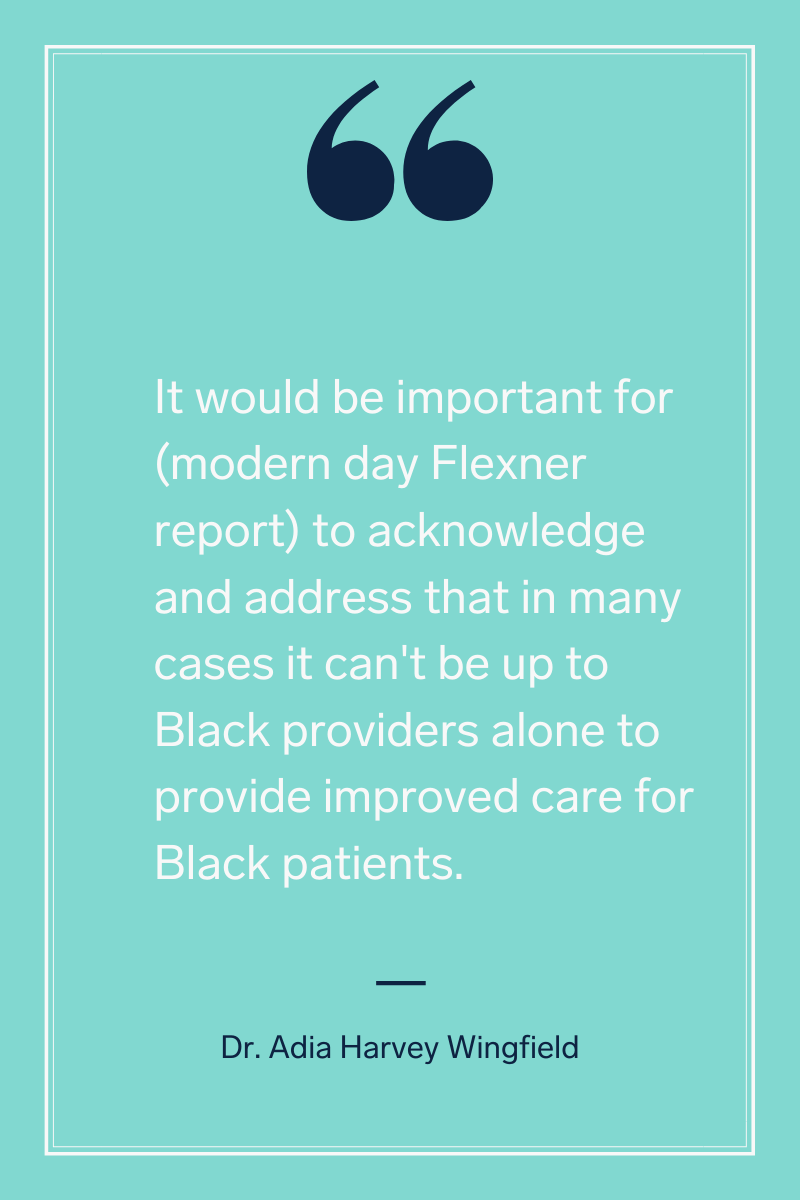
The third and final thing that would be important for a current report to acknowledge will be to address that in many cases it can't be up to Black providers alone to provide improved care for Black patients. One of the things that I learned in researching for Flatlining was that for many Black doctors, they experienced conditions where their White counterparts would treat them, for the most part, fairly equitably but their White counterparts weighed would racially stereotype and prejudge many Black, low income patients who were part of the healthcare system. They would assume that they were just seeking drugs. They would assume that they were more impervious to pain than they were. They wouldn't believe them or take them seriously when Black patients talked about the things that brought them to the hospital. So a modern day report would have to take into consideration the systemic and long term racial bias that's present on the part of many White health care providers, and to think and talk about ways to eradicate that issue so that doesn't continue to have an impact on Black patients. Also so that it helps create more equitable work outcomes for Black health care providers themselves who then wouldn't be in the position of having to resolve that work along with doing the work they're paid to do.
WTT: We're in the middle of not one, but two pandemics right now. The Black Lives Matter pandemic being connected to police violence makes it a secondary health care pandemic. In your professional opinion, would you advocate for the Black Lives Matter movement to advocate for equality in food accessibility which also contributes to a lot of preventative outcomes as well as how healthcare professionals are trained - or would you say it strengthens the core message of the BLM movement or dilutes it?
DAHW: I haven’t looked at the Black Lives Matter website in some time. It may be that there is already an acknowledgement that issues related to food access, food deserts, healthy eating, wellness and lifestyle, and the ways in which those are connected to other structures are already a part of their platform. Certainly I think that the things that provide a baseline level of health and access to those things are consistent with the goals of the Black Lives Matter movement.
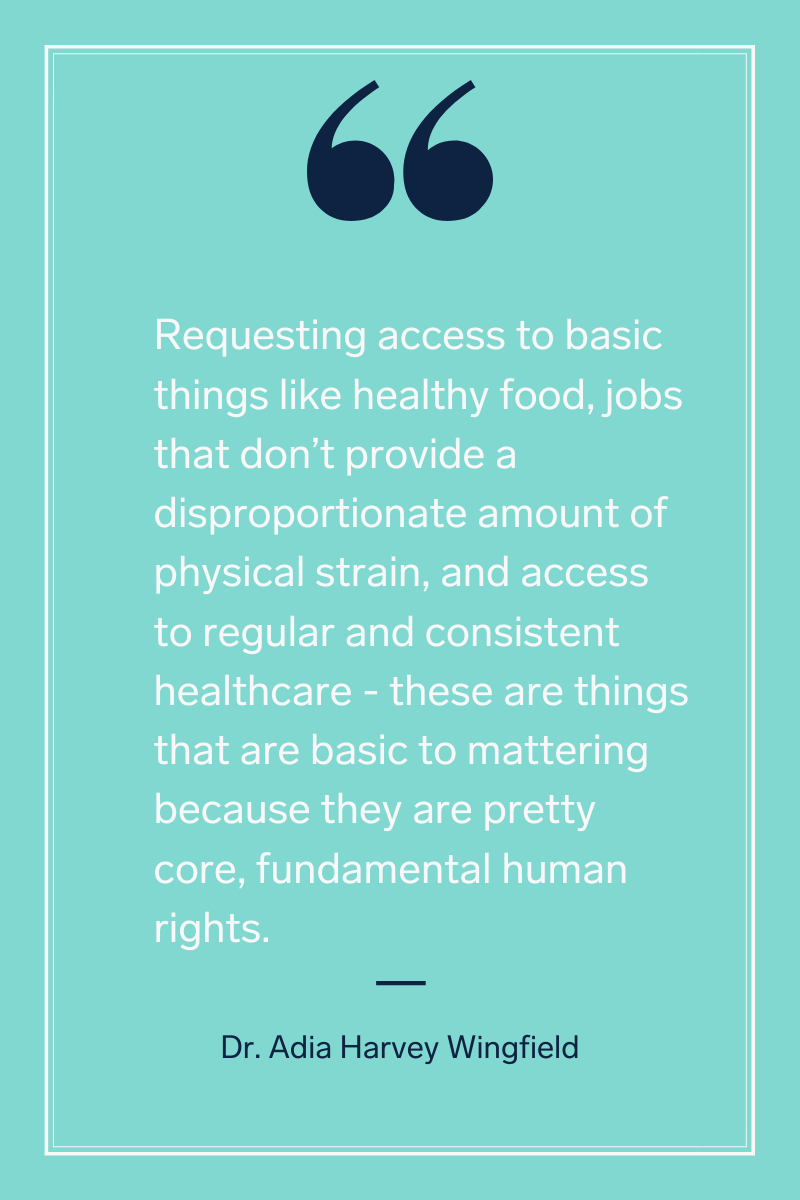
The movement actually has pretty straight forward goals. The comedian Michael Che has a joke that what the Black Lives Matter movement is simply asking for is for Black lives to matter. It’s not anything crazy or out of this world. It’s just asking for a baseline level of respect, fairness, and equitability and equal treatment that we see White Americans receiving. So I feel that requesting access to basic things like healthy food and the ability to afford healthy food, the ability to work in jobs that don’t provide a disproportionate amount of physical strain and taxation to the body, and the ability to have access to regular and consistent healthcare - these are things that are basic to mattering because they are pretty core, fundamental to human rights. So what the Black Lives Matter movement is asking for is that baseline level of humanity. Certainly having access to good health is a core part of humanity as well.
WTT: Given your work, is there anything else you would like to talk about that we haven’t touched on already?
DAHW: I would just add that with the protests in racial injustice and inequity happening and the attention being drawn to this issue, we are at a point where there is more conversation and discussion happening openly about this than there has been in some time. We also know from history as a guide that America has not done a great job in living up to its responsibility to provide an equitable landscape for all citizens.
In previous opportunities where we’ve been at a similar crossroads, the country has not lived up to its and it’s promise. The period after the Civil Rights movement, there was the opportunity to make Black Americans full participating members of U.S. society and redress the wrongs of slavery and make Black Americans equal. That was not done. The federal government failed. State governments failed. Many White Americans failed and did not make this a goal that they really attempted to achieve. Consequently, we saw generations of Jim Crow and inequality throughout the country. We had the Civil Rights movement in the sixties which certainly advanced important political and social goals in terms of the Voting Rights Act, Fair Housing Act, Civil Rights Act, but we also saw backlash as a consequence. Even with the enormous gains of the Civil Rights movement we still have yet to see Black Americans as full equal participants in U.S. society which is how we got here.
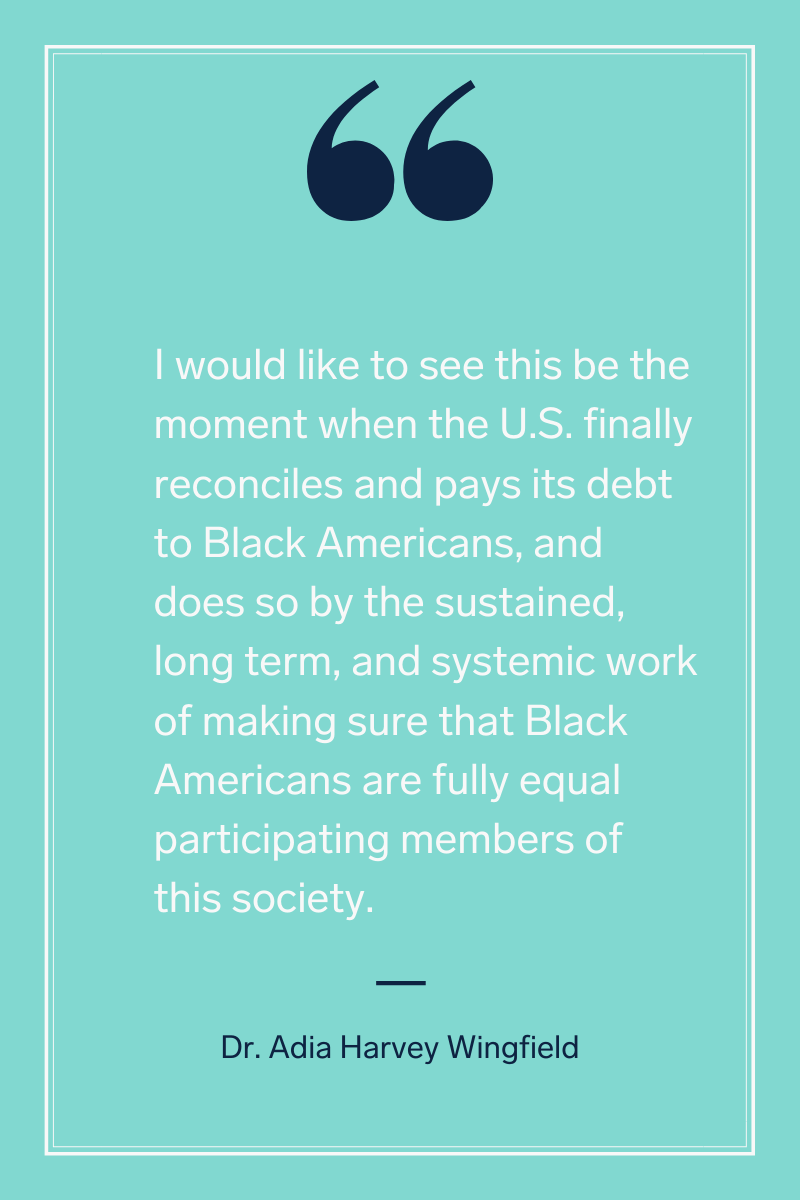
I would like to see this be the moment when the U.S. finally reconciles and pays its debt to Black Americans, and does so by the sustained, long term, and systemic work of making sure that Black Americans are fully equal participating members of this society. I don’t think that’s something that comes easily or quickly. It’s certainly not something that comes without a great deal of effort and sustained and significant change, but as we move into an era where the United States is going to become a multiracial place and people of color are going to become an increasing part of the society’s demographics, it seems to me that if we want to be a functioning society, we don’t really have a choice in making sure that we are a functioning society in a way that really includes all members of society, particularly those who are people of color and have historically been and continue to be disenfranchised.
More by Dr. Adia Harvey Wingfield in The Atlantic: Segregation Now, Segregation Tomorrow, Segregation Forever?
To follow her work or get in touch, you can find her on Twitter @AdiaHWingfield or on Facebook at Adia Wingfield.
More about Dr. Adia Harvey Wingfield
Adia Harvey Wingfield is the Mary Tileston Hemenway Professor of Arts & Sciences and Associate Dean for Faculty Development at Washington University in St. Louis. Her research examines how and why racial and gender inequality persists in professional occupations. Dr. Wingfield has lectured internationally on her research in this area, and her work has been published in numerous peer-reviewed journals including Social Problems, Gender & Society, and American Sociological Review. She is a former President of Sociologists for Women in Society (SWS) and currently President of the Southern Sociological Society (SSS), the largest regional professional sociological association in the US. In addition to her academic scholarship, Professor Wingfield writes for mainstream outlets including Slate, The Atlantic, Vox, and Harvard Business Review, and is the recipient of the 2018 Public Understanding of Sociology award from the American Sociological Association. Her most recent book is Flatlining: Race, Work, and Health Care in the New Economy.



